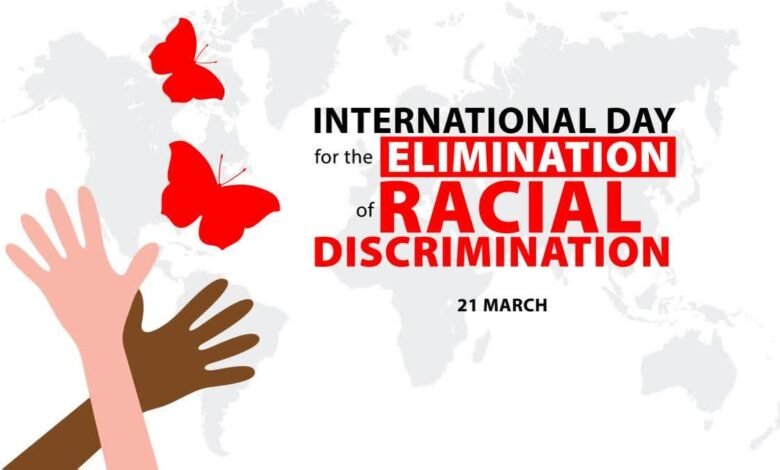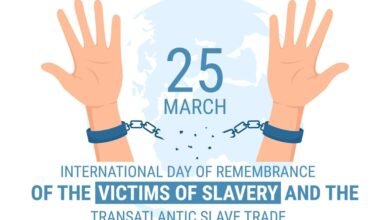International Day for the Elimination of Racial Discrimination 2025: A Call for Equality, Awareness, and Unity

March 21 marks the International Day for the Elimination of Racial Discrimination, a solemn reminder of the ongoing battle against racism, prejudice, and systemic inequality. This year, as we commemorate the 60th anniversary of the International Convention on the Elimination of All Forms of Racial Discrimination (ICERD), the call to action is stronger than ever. The Convention, adopted by the United Nations General Assembly in 1965, remains a landmark commitment to eradicating racism in all its forms.
Despite global efforts, racism remains a toxic legacy of enslavement, colonialism, and discrimination, continuing to corrupt societies, block opportunities, and erode justice. It is our shared responsibility to ensure that the ideals of dignity, equality, and human rights are upheld for all. This year’s theme, “60 Years of ICERD: Reflecting on Progress and Facing Challenges,” urges governments, civil society, and individuals to reaffirm their commitment to anti-racism and work towards a more inclusive and equitable world.
A Legacy of Struggle and Resistance
The observance of this day dates back to the tragic Sharpeville Massacre of 1960, where South African police opened fire on a peaceful protest against apartheid laws, killing 69 unarmed individuals. This brutal event ignited international outrage and reinforced the global struggle against racial segregation and injustice. In response, the United Nations proclaimed March 21 as the International Day for the Elimination of Racial Discrimination in 1966, vowing to fight against racist ideologies and practices worldwide.
Since then, significant strides have been made, including the end of apartheid in South Africa, the rise of civil rights movements across the world, and the implementation of anti-racism laws in many countries. However, as recent incidents continue to show, racial discrimination is far from eradicated.
Racial Discrimination in the Modern World
Persistent Racial Inequality and Hate Crimes
Despite progress, racial discrimination remains embedded in societies across the world. The recent rise in hate crimes, xenophobia, and racial injustice highlights the deep-rooted prejudices that still exist:
- Netherlands: A 2023 study by the Dutch Central Bureau of Statistics revealed that 1.6 million people reported experiencing discrimination, mainly due to race, skin color, and nationality.
- United Kingdom: In 2023-2024, over 70% of all hate crimes were racially motivated, with 98,799 cases of racial attacks recorded.
- France: 16,000 racist, xenophobic, and anti-religious crimes were reported in 2024, a stark increase from the previous year.
- United States: The 2020 murder of George Floyd by a white police officer reignited global protests, exposing deep racial divisions within the country’s law enforcement and justice system.
- India: Incidents of racial violence against African students and immigrants have sparked outrage, with cases like the 2017 attack on Nigerian student Endurance Amalawa in Delhi raising concerns about racial intolerance.
These cases are just a few examples of the ongoing racial injustices that communities face daily. The spread of racism online, fueled by social media algorithms that monetize hate and division, further exacerbates these issues.
The Impact of Racial Discrimination on Children
Racism does not only affect adults, it has devastating effects on children, shaping their worldview, self-esteem, and opportunities. Children of color often face discrimination in schools, healthcare systems, and the criminal justice system.
- Education Inequality: Many children from marginalized racial backgrounds receive lower-quality education, face harsher disciplinary measures, and have limited access to higher education opportunities.
- Psychological Impact: Exposure to racism and discrimination leads to higher rates of anxiety, depression, and stress among children. The burden of navigating racial bias at a young age can stunt emotional and psychological development.
- Racial Profiling and Criminalization: Studies have shown that Black and minority children are more likely to be disciplined, suspended, or even criminalized compared to their white peers, leading to the school-to-prison pipeline phenomenon.
Protecting Our Children from Racism
To build a future free of racial discrimination, we must prioritize the protection and education of children. This includes:
- Teaching children about diversity and inclusion – Schools must incorporate anti-racism education in their curricula.
- Creating safe spaces for open discussions – Encouraging children to talk about their experiences with race can help dismantle bias from a young age.
- Advocating for policy changes – Governments must ensure equal access to quality education, healthcare, and justice for all children, regardless of race.
- Challenging systemic racism – Parents, educators, and communities must work together to dismantle discriminatory systems that place children of color at a disadvantage.
The Role of the International Convention on the Elimination of Racial Discrimination (ICERD)
The ICERD, adopted in 1965, remains the cornerstone of global efforts to fight racial discrimination. It mandates that all signatory nations take action to eliminate racial prejudice and promote equality in legislation, policies, and practices.
Key Achievements of ICERD Over 60 Years
- Legal Protections: Many countries have strengthened anti-discrimination laws, making racial profiling, hate speech, and racially motivated violence punishable offenses.
- Recognition of Rights: Marginalized racial groups have gained legal recognition, including indigenous rights, reparations for past injustices, and increased political representation.
- International Monitoring: The United Nations Committee on the Elimination of Racial Discrimination (CERD) holds countries accountable for violations of racial equality.
However, many challenges remain. The rise of far-right extremism, digital hate speech, and racial inequalities in economic and social structures continue to undermine the spirit of ICERD.
Taking Action: How You Can Help Combat Racial Discrimination
- Education – Learn about racism and its effects on society.
- Intention – Be deliberate in challenging biases in yourself and others.
- Courage – Speak up against racism when you see it.
- Individuality – Recognize that no race is superior or inferior to another.
- Humanity – Treat everyone with dignity and respect.
- Anti-racist Work – Take part in campaigns and activism.
- Equality – Advocate for equal rights and opportunities for all.
- Empathy – Understand the struggles of those affected by racism.
- Allyship – Support and amplify the voices of marginalized communities.
- Love – Foster inclusivity and unity in your community.
Ways to Stand Against Racism
✔ Amplify the voices of marginalized communities – Listen to and share the experiences of those affected by racism.
✔ Reject hate speech and intolerance – Challenge racist narratives in media and politics.
✔ Teach children about fairness and human rights – Raise the next generation to value diversity.
✔ Support anti-racism organizations – Donate, volunteer, or participate in initiatives fighting racial injustice.
✔ Speak up against discrimination – Take action when witnessing racial bias.
Conclusion
As we mark the 60th anniversary of ICERD, we must reflect on how far we have come and how far we still have to go. The fight against racial discrimination is not over, it requires collective action, policy changes, and a deep commitment to justice and equality. Children deserve to grow up in a world where they are judged not by their race but by their character, dreams, and abilities. It is up to us to protect them, educate them, and create a future where racial discrimination is nothing more than a painful memory of the past.





